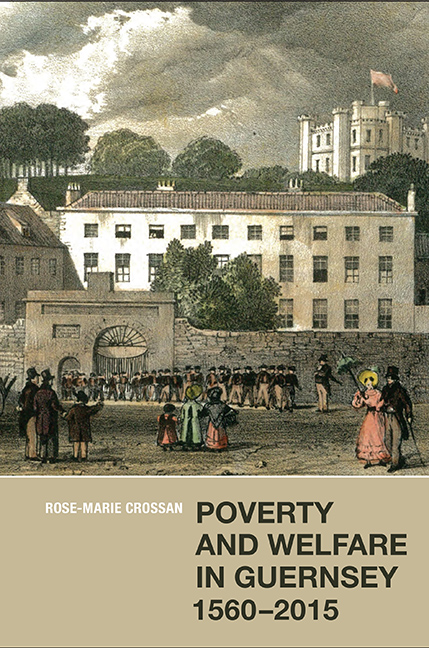Book contents
- Frontmatter
- Dedication
- Contents
- List of Illustrations
- Acknowledgements
- Abbreviations
- Conventions, Note on curren
- Maps
- Introduction
- I Context
- II Welfare
- III Town Hospital
- IV Twentieth Century and Beyond
- Conclusion
- Appendix 1 Writings on Peasant Proprietorship in Guernsey
- Appendix 2 Poor Rates, Indoor and Outdoor Relief Spending, St Peter Port, 1724–1924
- Appendix 3 Parochial Poor Relief in Other Channel Islands
- Appendix 4 Average Year-end Head-counts and Average Annual Admissions and Discharges, Town Hospital, 1700s–1900s
- Appendix 5 Adult Admissions Ascribed to Illness and Accidents, Town Hospital, 1852–1919
- Appendix 6 Relative Proportions of Men and Women in Year-end Head-counts and Annual Admissions, Town Hospital, 1750–1919
- Appendix 7 Annual Averages of Child Admissions and Year-end Numbers, Town Hospital, 1756–1919
- Appendix 8 Over-60s as a Proportion of all Inmates, and Composition by Sex of Over-60s Cohort, Town Hospital, 1756–1911
- Appendix 9 Average Weekly Amounts Purchased per Head, Town Hospital, 1760–1917
- Appendix 10 Timeline: Developments in Poor Relief and Social Security, 1700–2010
- Bibliography
- Index
3 - Beginnings of Parochial Poor Relief
Published online by Cambridge University Press: 18 June 2021
- Frontmatter
- Dedication
- Contents
- List of Illustrations
- Acknowledgements
- Abbreviations
- Conventions, Note on curren
- Maps
- Introduction
- I Context
- II Welfare
- III Town Hospital
- IV Twentieth Century and Beyond
- Conclusion
- Appendix 1 Writings on Peasant Proprietorship in Guernsey
- Appendix 2 Poor Rates, Indoor and Outdoor Relief Spending, St Peter Port, 1724–1924
- Appendix 3 Parochial Poor Relief in Other Channel Islands
- Appendix 4 Average Year-end Head-counts and Average Annual Admissions and Discharges, Town Hospital, 1700s–1900s
- Appendix 5 Adult Admissions Ascribed to Illness and Accidents, Town Hospital, 1852–1919
- Appendix 6 Relative Proportions of Men and Women in Year-end Head-counts and Annual Admissions, Town Hospital, 1750–1919
- Appendix 7 Annual Averages of Child Admissions and Year-end Numbers, Town Hospital, 1756–1919
- Appendix 8 Over-60s as a Proportion of all Inmates, and Composition by Sex of Over-60s Cohort, Town Hospital, 1756–1911
- Appendix 9 Average Weekly Amounts Purchased per Head, Town Hospital, 1760–1917
- Appendix 10 Timeline: Developments in Poor Relief and Social Security, 1700–2010
- Bibliography
- Index
Summary
Pre-Reformation
Parishes
Parishes began to develop in western Europe in the second half of the first millennium. They arose primarily from the setting of territorial boundaries around churches to determine the area from which the tithe (intended to support a priest) would be collected. In Guernsey, evidence points to the establishment of parishes by the early eleventh century.
In the course of time, Rome's imposition of a duty on the inhabitants of all parishes to share in the upkeep of their churches necessitated the establishment of communal church maintenance funds. The earliest such funds were established in twelfth-century France and Germany, and lay office-holders charged with their management appeared soon afterwards. In France, these were known as fabriciens, marguilliers or trésoriers. In England, such officers first appeared in the thirteenth century, and came to be known as churchwardens. Guernsey's records indicate that parishioners were actively contributing to church upkeep and running costs by at least the fourteenth century. There is litigation dating from the 1360s on the division of these costs between the parishioners of the Vale and the Prior of St Michel du Valle, in which the parish was represented by its thesaurius (trésorier), who was by then annually presenting his accounts in the parish church.
Nowhere in medieval Europe was there a clear distinction between the ecclesiastical and secular activities of parishes. Sunday Mass provided an opportunity to announce news or discuss issues, and, in the absence of other public buildings, churches served a variety of communal purposes. Aside from their religious function, Guernsey's medieval churches served as storage places for parochial weaponry and as venues for the public passing of contracts and the election of Jurats. Such activities would have created a need for some form of secular parochial organisation. Evidence of such in Guernsey exists from the fifteenth century: there are records of a Douzaine appointing a granger of St Peter Port in 1444 and of parish constables from 1481.
Welfare
Under the Roman Catholic regime of pre-Reformation Europe, charity towards the poor was seen as a Christian duty through which salvation could, in part, be earned. Scripture deemed the poor to be closer to heaven than the wealthy, and the latter at risk of damnation if they took pride in their wealth.
- Type
- Chapter
- Information
- Poverty and Welfare in Guernsey, 1560-2015 , pp. 45 - 59Publisher: Boydell & BrewerPrint publication year: 2015



